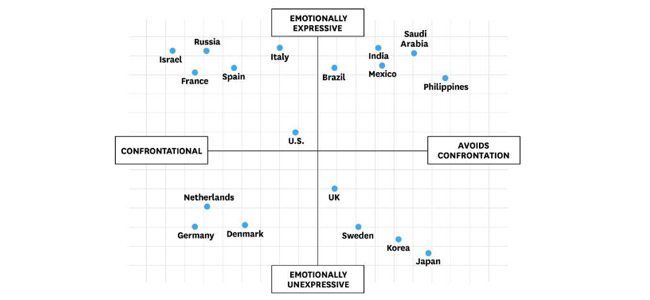Be culture savvy to work effectively in the global office
- blogs
- 16 min read
Ever dealt with opaque Japanese customers who won’t make eye contact? Or Israelis who will spend hours debating the pros and cons of your product? How about brusque and businesslike Germans who like to stay on the topic?
In the global economy of today, effective communication can make or break deals. Meetings, conference calls, emails and messenger conversations with people from other geographies are de rigueur, making cross-cultural communication a critical skill for managers and leaders. While a company’s culture predominates in corporate environments, never forget that each person you encounter will invariably carry the cultural ethos of their country in their verbal communication, body language and nonverbal cues.

When mapped against an “emotional expressiveness” versus “avoiding confrontation” scale (see below), interesting patterns emerge. Management professional Erin Meyer has found a wide range of behaviours based on the nationality of the person. Israelis and Russians score very high on emotionally expressive and confrontational behaviour. Indians fall on the adjacent quadrant, being quiet expressive emotionally but tending to avoid conflict.
Several European countries fall in the “emotionally unexpressive and confrontational” quadrant - Germans leading the pack and perhaps conforming to the ‘non-emotional at work’ stereotype. Asian giants Japan and Korea are the flip side of this sentiment - the study says they are emotionally unexpressive and avoid confrontation. This is perhaps due to the collectivist and hierarchical nature of those societies.
Several European countries fall in the “emotionally unexpressive and confrontational” quadrant - Germans leading the pack and perhaps conforming to the ‘non-emotional at work’ stereotype. Asian giants Japan and Korea are the flip side of this sentiment - the study says they are emotionally unexpressive and avoid confrontation. This is perhaps due to the collectivist and hierarchical nature of those societies.
Preparing to face Your counterpart
The map below sorts nationalities according to how confrontational and emotionally expressive they are. Although negotiators often believe that the two characterstics go hand in hand, that's not always the case.

Chart: Determine how you deal with your counterpart based on where they come from
What are the particular lessons for product professionals? For one, don’t get offended with colleagues or customers from the “confrontational” cultures when they openly disagree and debate on issues. On the flip side, you’ll have to watch for subtle cues from those cultures that avoid confrontation. Emotional expressiveness coupled with avoidance of conflict (Saudi Arabia) can be quite puzzling as well - guard for behaviour that could be construed as insulting.
On the proactive side, product leaders must not forget to work on their own communication skills. IPL’s curricula incorporate vital communication and executive presence courses with our top faculty - Prof. Pinkesh Shah’s Advanced Presentation Skills courses, Prof. Vishy’s Communications classes and Prof. Ameen Haque’s storytelling for business sessions are invariably packed by students and alumni eager to build or refresh their skills. Shareathon showcased the presentation and communication skills of many alumni, as they spoke about a wide variety of topics and experiences.
Understanding the nuances of cross-cultural communication and using the rules appropriate for your setting can go a long way in making meetings and presentations effective. Do your homework before your next big meeting!
On the proactive side, product leaders must not forget to work on their own communication skills. IPL’s curricula incorporate vital communication and executive presence courses with our top faculty - Prof. Pinkesh Shah’s Advanced Presentation Skills courses, Prof. Vishy’s Communications classes and Prof. Ameen Haque’s storytelling for business sessions are invariably packed by students and alumni eager to build or refresh their skills. Shareathon showcased the presentation and communication skills of many alumni, as they spoke about a wide variety of topics and experiences.
Understanding the nuances of cross-cultural communication and using the rules appropriate for your setting can go a long way in making meetings and presentations effective. Do your homework before your next big meeting!
Explore Our Programs
Institute of Product Leadership is Asia’s First Business School providing accredited degree programs and certification courses exclusively in Product Management, Strategy, and Leadership.
Talk to a counselor today and embark on your journey towards becoming an exceptional product manager.
Whether you’re seeking advice on career paths, looking to enhance your skills, or facing challenges in your current role, our counselors are ready to provide valuable insights and actionable strategies.
Facebook
Twitter
LinkedIn
Our Popular Product Management Programs
Our Trending Product Management Programs
Trending Posts
Tagged blogs






